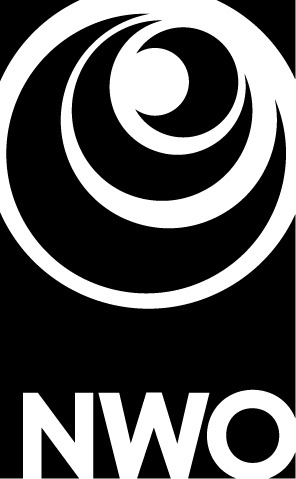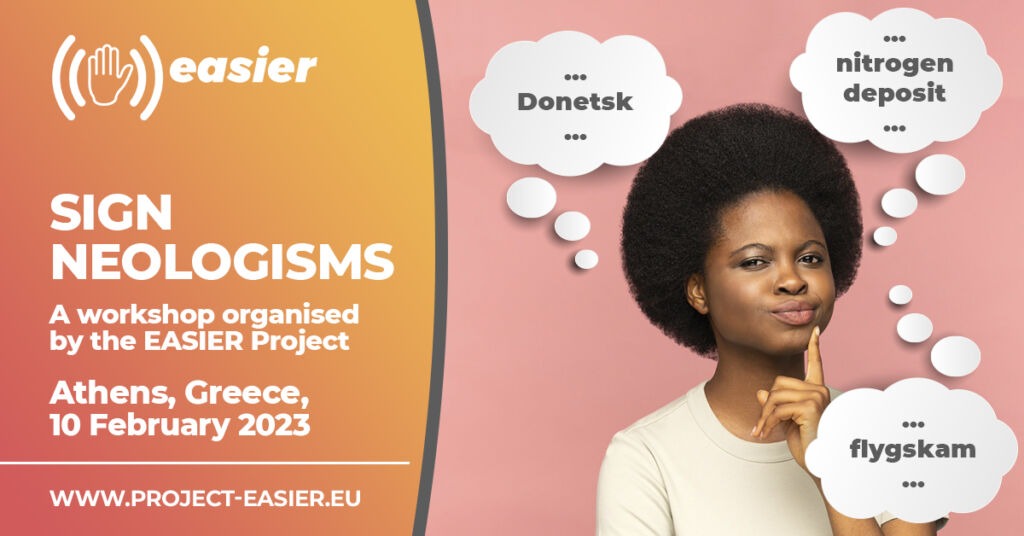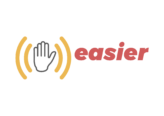
- This event has passed.
Sign Neologisms
February 10, 2023 All day
Athens, Greece, 10 February 2023 (9:30am-5:30pm)
Workshop languages: English and international sign; interpretation is provided
Sign Neologisms: a workshop organised by the EASIER Project
Spoken language lexicons contain up to hundreds of thousands of words, whereas sign language lexicons — that have been documented so far — contain tens of thousands of words, including the regional lexical variation within the language. There is a demand from many sectors of society to create new signs to match concepts already lexicalised in the spoken language, as well as to account for new terms from evolving social dynamics and concepts, new technologies, and world events. The Sign Neologisms workshop aims to put the process of sign creation centre-stage and discuss various aspects of neologisms in the context of translation and interpretation. These processes can be linked to both human translators and interpreters and post-editors, as well as machine translation, producing sign synthesis by means of avatars on the basis of spoken or written language use. In this workshop, six presentations will address the following three themes, with ample time given for discussion and networking around these topics (plus an exhibition session):
- Ethics: What are the norms and values that should be taken into account when creating or using new sign forms? Who should be involved in the creation/selection/spread of new forms? Why is this important? What are the consequences if the norms and values are not followed?
- Linguistics: What counts as a lexical gap in a sign language, and what are the linguistic strategies used to create new forms? What makes a new sign well-formed? What does research on normal lexical variation in sign languages contribute to our understanding of sign neologisms?
- Procedural matters: What are the (post-editing and language planning) workflows involved in introducing terms in a translation? What can we learn from standardisation of terminologies in spoken languages?
Workshop attendance is free, but space is limited to 30 participants (in addition to the EASIER project partners). The registration is required and it is available at ti.to/easier/sign-neologism-workshop.
We also invite both academics and other professionals, such as interpreters/translators, post-editing providers, educators, lexicographers, etc., to participate in an exhibition/poster session. Presentations should address how neologisms are approached in their work.
If registration exceeds 30 people, participants who participate in the exhibition/poster session will be given preference (describe your exhibit/poster in the registration form).
Please contact Dr. Hope Morgan (Radboud University) with any questions: hope.morgan@ru.nl
AGENDA
- 9:30 am: Welcome
- Morning programme:
- Overview of EASIER project; issues with neologisms and lexical gaps
- “Neologisms in sign languages: linguistic issues” by Kearsy Cormier (University College London, UK):
- Poster/Demo session (see below for more details)
- Lunch
- Afternoon programme:
- “How to fill lexical gaps in NGT?” by Richard Cokart (Dutch Sign Centre, Netherlands):
- “Creating signs in technical and scientific fields” by Cyril Claudet (STIM Sourd France):
- “Interpreter’s ethics: role and legitimacy in the process of creating sign language neologisms in the professional field” by Marine Dupont, Aline Alemany and Claire Bonrepos (Interpretis, France)
- Group discussion
- 5:30 pm: Closing
Poster session
- Rosalee Wolf (Institute for Language and Speech Processing, AthenaRC): an avatar capable of producing neologisms is a technology that has the potential to act as a resource in linguistic study of sign languages as well as practical application for increasing Deaf accessibility to written and spoken information. This poster / demo will describe state-of-the-art strategies to synthesize new words.
- Fanny Chopot (Sign’Maths, France): presenting Sign’Maths, a project which aims to create signs in the field of mathematics at all education levels (in partnership with Paul Sabatier University [Toulouse, France]); includes issues that emerged for students in understanding and adapting the neologisms (signmaths.univ-tlse3.fr)
- Laurence Gagnon (Université de Namur and Université du Québec à Montréal, Canada): exploring the linguistic and sociolinguistic factors that influence the acceptability of neologisms in LSQ (Québec Sign Language); working with a corpus of 99 neologisms proposed by Deaf signers of LSQ
- Lorraine Leeson (Trinity College Dublin, Ireland and SignON): introducing a new glossary of new terms in Irish Sign Language for domestic, sexual and gender-based violence; contributing to the Justisigns 2 project (justisigns2.com)
- Rachel Moiselle (Trinity College Dublin, Ireland and SignON): investigating gesture and depiction in a range of new glossaries of Irish Sign Language and leveraging focus groups for insight into neologisms
- Christian Rathmann (Humboldt-Universität zu Berlin, Germany): types of iconic strategies used in the creation of technical signs in sign2mint.de, and various linguistic processes observed (back translation, lexicalisation, compounding, etc.)
- Irene Strasly (University of Geneva, Switzerland): in work with Laurence Gagnon, comparing neologisms from Quebec Sign Language and Swiss French Sign Language in the major structural constituents of the signs (hand configuration, place of articulation, and movement)
- Bruno Sonnemans (LAB-LSFB at University of Namur and LSFB asbl, Belgium): Sign Neologisms & Etymology

The Sign Neologisms Workshop was supported by VICI grant no. 277-70-014 of the Dutch Research Council (NWO)


